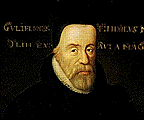October 6: The Death of William Tyndale
William Tyndale (d. 1536)
It was on this date, October 6, 1536, that William Tyndale, the priest and scholar who translated the Bible into English, was strangled and burned to death in Belgium – a victim of religious intolerance during the Reformation.
He was born on an unknown date in 1484. Tyndale went to school at Oxford, and later at Magdalen Hall and Cambridge. He developed an attachment to reformist ideas in religion and his disputes with Roman Catholics over doctrine forced him out of a tutoring job. In London, Tyndale conceived the idea of translating the Bible into vernacular English, so that even "a boy that driveth the plough" might – not read them, of course, because literacy was in the single digits at the time, but understand the words in English, rather than the original Greek and Hebrew.
The idea was opposed by clerics such as Bishop Cuthbert Tunstall. It was argued that only the Pope could dispense biblical teachings. For his safety, Tyndale crossed to Europe. He found friends and hiding places, some so secret they remain unknown to this day, where he could spend the time it took to meticulously and poetically render the complex dead languages.
Circulating Tyndale's translation would have been impossible without the printing press, which had been invented only in the previous century, and might have been prevented altogether when a loose-lipped printer let slip his part in the project. Having begun the printing at Cologne, Tyndale had to escape to Worms. The printing was completed by the end of 1525. By subterfuge, Tyndale was able to get copies back into England, and a second printing was unknowingly financed by Bishop Tunstall, who believed he was buying up all copies to have them burned!
But the authorities were closing in on Tyndale and used subterfuge of their own: an Englishman named Henry Phillips betrayed Tyndale to the imperial authorities. In 1535 Tyndale was arrested in Antwerp and confined in the castle of Vilvorde, near Brussels. After spending 15 months in prison, he was condemned to the stake, but was mercifully strangled before the fires burned him.*
The heretical work of William Tyndale included the first printing of the New Testament in English from the Greek, rather than from the Latin Vulgate. Three years after Tyndale's death, the completed English Bible, including the work of Myles Coverdale, was legally printed in England. Regardless of what Freethinkers think of the contents of the book, we can cheer this triumph over censorship as we condemn the martyrdom of a man who died for it.
* An account of Tyndale's martyrdom, published in 1684 (148 years after the fact), can be found in Fox's Book of Martyrs.
Originally published October 2003 by Ronald Bruce Meyer.


